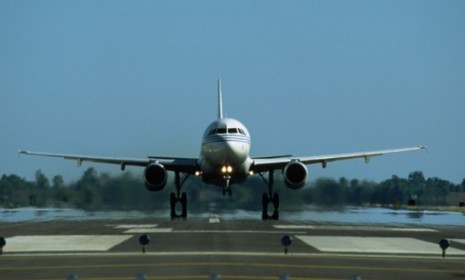The 'ridiculous' FAA shutdown: An instant guide
As the Senate fails to temporarily finance the Federal Aviation Agency, 4,000 airport workers are being furloughed and millions of dollars are being lost every day

A free daily email with the biggest news stories of the day – and the best features from TheWeek.com
You are now subscribed
Your newsletter sign-up was successful
Congress may have hammered out a debt deal earlier this week, but the Senate has left for its August recess without resolving another key stalemate: This time, over the temporary financing of the Federal Aviation Administration, which governs most aspects of the nation's airports and air travel safety. That means the "ridiculous" partial shutdown of the FAA that began July 23 will likely continue through September. Here's a rundown of the clash and the consequences:
What's behind the shutdown?
Over the last four years, Congress passed no less than 20 temporary spending bills financing the FAA, while debate continued over a "larger, long-term authorization of the agency's budget and capital plans," says Edward Wyatt at The New York Times. When FAA financing expired last month, another temporary bill passed through the House, but has been stopped by negotiations in the Senate — and will remain unresolved until Congress resumes in early September.
The Week
Escape your echo chamber. Get the facts behind the news, plus analysis from multiple perspectives.

Sign up for The Week's Free Newsletters
From our morning news briefing to a weekly Good News Newsletter, get the best of The Week delivered directly to your inbox.
From our morning news briefing to a weekly Good News Newsletter, get the best of The Week delivered directly to your inbox.
What are the sticking points?
One focus of the "bickering" is a GOP push to end a $14 million subsidy for commercial air service to rural airports, says Kirsten Boyd Johnson at Wonkette. Many of those airports, says Pat Garofalo at Think Progress, are concentrated in states that Democratic senators represent. But the main reason talks have stalled is disagreement over the bill's anti-union legislation, which Republicans claims major airlines like Delta support. The GOP "is willing to shut down the FAA" in order to get its "union-busting" language through.
What's the fallout?
Currently 4,000 FAA employees are being furloughed. Airport safety inspectors — who ensure airports comply with federal regulations — have been asked to continue working without pay, and must personally fund their government travel expenses "to keep airports operating safely," says Wyatt. That's a hefty financial burden: Inspectors typically travel to five different airports every two weeks. "We are depending and living on their professionalism at this point," says FAA administrator Randy Babbitt. Airport construction projects around the country are also on hold, leaving tens of thousands workers out of work.
A free daily email with the biggest news stories of the day – and the best features from TheWeek.com
What about the cost?
When FAA financing expired in July, notes Wyatt in the Times, "the agency also lost the ability to collect taxes on airline tickets." A stalemate that lasts through Labor Day could cost the government up to $1 billion in lost tax revenues. Each day, says Johnson, the government loses $30 million — hardly worth the argument over a $14 million rural airport subsidy.
Will air travel be safe?
The FAA insists it will. Air traffic controllers remain on the job, says Chris Morran at The Consumerist. As such, flying is safe, says Transportation Secretary Ray LaHood. "Air traffic controllers are guiding airplanes. Safety inspectors are on duty and doing their job. No one needs to worry about safety."
Sources: Consumerist, NY Times, Think Progress, Wonkette
-
 The Olympic timekeepers keeping the Games on track
The Olympic timekeepers keeping the Games on trackUnder the Radar Swiss watchmaking giant Omega has been at the finish line of every Olympic Games for nearly 100 years
-
 Will increasing tensions with Iran boil over into war?
Will increasing tensions with Iran boil over into war?Today’s Big Question President Donald Trump has recently been threatening the country
-
 Corruption: The spy sheikh and the president
Corruption: The spy sheikh and the presidentFeature Trump is at the center of another scandal